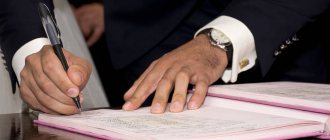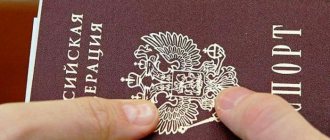What should you do if you find out that an agreement has been concluded on your behalf and your signature on it has been forged? This could be a loan agreement in which one of your loved ones signed for you, issued a loan, and you became a co-borrower. There may be a purchase and sale agreement, a lease agreement or any other. Such situations are not uncommon.
Your actions will depend on the circumstances in which you learned about the existence of an agreement with a forged signature, and at what stage the case is at. Let's consider typical situations and sequence of actions.
Situation 1 – Legal proceedings have not yet been initiated under an agreement with a forged signature
For example, you found out that your spouse took out a loan for you and himself, signing for you in the loan agreement. Unfortunately, this happens. If you do not agree with this situation, you have the right to contact the bank with a statement that you did not sign the agreement and are not a co-borrower. The bank has two options: either reconsider the terms of the loan or refuse you. Not answering anything is, in fact, also a refusal. And then you will face a judicial procedure for declaring the contract invalid or unconcluded.
How to raise the question - about the invalidity or non-conclusion of the contract - depends on the situation. Typically, judicial practice considers an agreement with a forged signature to be unconcluded. But if there is a borrower in the agreement besides you, whose signature is not disputed, then it is better to raise the question of invalidating the agreement.
As a sample when preparing a claim, you can use statements of claim in the cases of our clients, inserting your data into them.
Claim to invalidate a loan agreement or mortgage agreement (falsified signature)
Claim to invalidate the surety agreement (fake signature)
Criminal liability for signature forgery
How can a criminal case of forgery of a signature turn out? Today, forgery of signatures on documents can result in either monetary or more serious punishment, up to and including imprisonment. These cases are few, but they are worth knowing:
- In the case when a criminal case is initiated under Art. 327, the fact of falsification of documents will be considered, thanks to which a person was able to enjoy rights not due to him or to be freed from unwanted responsibilities. Punishment in such a criminal case can be imposed as a restriction or imprisonment for up to 2 years.
- When the falsification was made to conceal another crime or facilitate its commission, the responsibility will be more serious - the offender will have to spend time either doing compulsory labor for 4 years or in prison for the same period.
- If a criminal case is opened against a person who uses a deliberately forged document, but does not produce it, the punishment will be more lenient. In this case, you can get by with a fine of up to 80 thousand rubles, or disciplinary work for up to 2 years. Article 327 of the Criminal Code of the Russian Federation also implies in this case the possibility of arrest. But today there are no arrest houses left in Russia. Therefore, since 1996, the practice of arrest has not been applied.
If the violation concerned the forgery of stamps or signatures on medicine papers, for a single case this means imprisonment for up to 3 years. If an organized group participated in the crime, the imprisonment may be extended. The minimum period for this example will be 5, and the maximum will be 10 years.
Please also note that criminal prosecution threatens both the manufacturer and the person who used the counterfeit papers.
Situation 2 – There is a lawsuit underway regarding an agreement with a forged signature, but there is no court decision yet
If you intend to challenge a contract with a forged signature in court, pay attention to the following.
- Organize and conduct a preliminary examination of the forged signature.
Before submitting a claim to the court (or explanations, if the process is already underway), you need to conduct an appropriate handwriting examination. Moreover, this must be done on your own initiative and at your own expense in order to justify your position before the court. For Russian courts, only documentary evidence has always mattered, and an expert’s opinion is a very significant argument.
- What must be submitted for examination of a forged signature?
First, the disputed contract with signature. Here you need to keep in mind the nuances related to whether you have the original contract or just a photocopy of it.
If there is no original, this is not a problem; this does not interfere with the examination. However, in the copy the signature being examined may not be legible enough. In this case, the conclusion will be probabilistic: the expert will indicate that the signature was “probably” made not by you, but by another person.
If the signature in the photocopy is legible, then there are no problems, the expert will write an unequivocal conclusion that the signature was not made by you. A probabilistic or unambiguous conclusion at this stage is not of particular importance, because by court decision, another examination will still be carried out. More on this later.
To conduct the research, you will need to provide samples of your signature. Firstly, experimental samples - for this you just sit down at the table right in the expert organization and write down several sheets of paper. Secondly, documentary samples. To do this, you need to find documents relating to the period when the disputed agreement was concluded, with your valid signature. These could be receipts for payment of utility bills, an employment contract or other documents from your place of work, signatures from bank statements, etc. Think in advance where you signed and prepare these documents for the experts.
- Prepare for forensic examination.
To verify your arguments, the court will order a forensic examination, and based on its results it will make a decision. Therefore, you need to find a second expert organization in advance and discuss with their employees the possibility of conducting an examination based on a court decision.
At the same time, it is not a fact that the court will order a forensic examination there - it can choose experts proposed by your opponent (if he proposes them). However, you can confidently petition the court to select the expert institution indicated by you, especially if you provide their consent to conduct such an examination and provide payment for their services, and to submit the questions you specified to the expert for resolution. Therefore, it is important for you to agree on all this with experts in advance.
So, having prepared evidence of a forged signature in this way, you can count on the court to make a decision to declare the contract invalid (not concluded).
Situation 3 – A court decision was made under an agreement with a forged signature, but it did not come into force
If a court decision has already been made under an agreement with a forged signature, which imposes an obligation on you for which you did not sign, but it has not yet entered into force, urgently write an appeal.
A decision that has entered into force entails the possibility of enforcement proceedings, so your task is to postpone the appearance of the bailiffs for as long as possible.
In your appeal, present all your arguments as described in the previous paragraph. And justify why you did not present them in the first instance - or, if you did, why the court did not take them into account.
As a sample when preparing an appeal, you can use complaints from our clients.
Appeal against a decision to foreclose on a loan or foreclose on an apartment (fake signature)
Petition to reinstate the time limit for filing an appeal (falsified signature)
Comments on Art. 327 Criminal Code of the Russian Federation
The object of the crime is the method of production and sale established by law: papers of an approved sample, stamps and state awards, as well as forms and seals. The subject of the offense is:
- Official or personal documents that allow you to obtain additional rights or avoid obligations of both legal entities and individuals.
- Fake government insignia, gratitude.
In this case, a personal official document is accepted as identification. It contains complete or partial information about the owner. This could be demographic, social, or job-related data. The concept of another official document refers to papers of an approved sample that allow the use of additional benefits or relieve one from any obligations that have been analyzed.
If examined, a counterfeit document will be one that, in the process of certain actions, began to bear the external and qualitative characteristics of the original. Not only the production itself, but also the use for any purpose of a false document will also be considered a crime.
The use of counterfeit papers will be considered to be presented to officials or private individuals to carry out fraudulent activities or to conceal the fact of a crime. The end of the crime in this case will be the moment of production, sale or presentation of false papers or documents containing fictitious information. A person who has reached the age of 16 and has passed a sanity examination will be considered a person who has committed a crime. If it is implied that the person only produced these papers, or is an authorized person, the crime is considered under Articles 327, Part 3 and 292 of the Criminal Code of the Russian Federation. The corpus delicti in this case is characterized by the established fact of an attempt to use false documents.
Situation 4 – Enforcement proceedings have been initiated under an agreement with a forged signature
Here the situation is, of course, more complicated. If you have already been recognized as a debtor under an agreement with a forged signature and the court has made a decision to collect the debt from you, then you will have to return the attention of the courts to the very beginning of your story, while at the same time fighting off the bailiffs.
What to do in this case?
- File a claim to invalidate an agreement with a forged signature. And act according to the scheme described in situation 2.
- Apply for the suspension of enforcement proceedings until the court makes a decision on your claim about the invalidity of the contract.
Formally, you do not have grounds for suspension in connection with filing such a claim, but you can refer to paragraph 1 of part 2 of Article 39 of the Law “On Enforcement Proceedings” or challenge the decisions of the bailiff. It all depends on your skill in applying the rules on appeal. Essentially, your task is to wait for the decision to invalidate the contract, on the basis of which a reversal of execution will be possible.
As a sample, you can use the documents prepared by us to protect the rights of our clients, inserting your data into them.
Administrative claim against the bailiff (official forgery)
Complaint against a bailiff to the Federal Bailiff Service (official forgery)
Summary
So, we have described an approximate sequence of actions in a situation where someone forged your signature and you have problems in this regard. You can use our tips and go through the process yourself. We are always ready to support you in an advisory manner.
We have developed positive judicial practice in invalidating contracts with a forged signature, and have experience in arguing and organizing the process. You can familiarize yourself with court decisions in our cases and use arguments to defend yourself in similar situations.
Decision to invalidate the surety agreement (falsified signature)
Decision to invalidate the loan guarantee agreement (falsified signature)
If you don’t want to conduct the process on your own, please contact us. The main goal of our work is to help everyone in our power and capabilities.
When there is no liability for forging a signature
A crime is considered to be the case when a document is official, has legal force and releases from any obligations or provides additional benefits. Otherwise, counterfeiting is not considered the subject of a crime.
In addition, let us turn to Article 14 of the Criminal Code of the Russian Federation. It says that although there are signs of a violation, an act or inaction of a person is not considered a crime if it does not cause harm to others.
Bykov Boris Nikolaevich
Lawyer at the Legal Defense Board. Candidate of Legal Sciences. Work experience in the field of criminal law - 14 years. Defense in court, full case management, preparation of documents.






